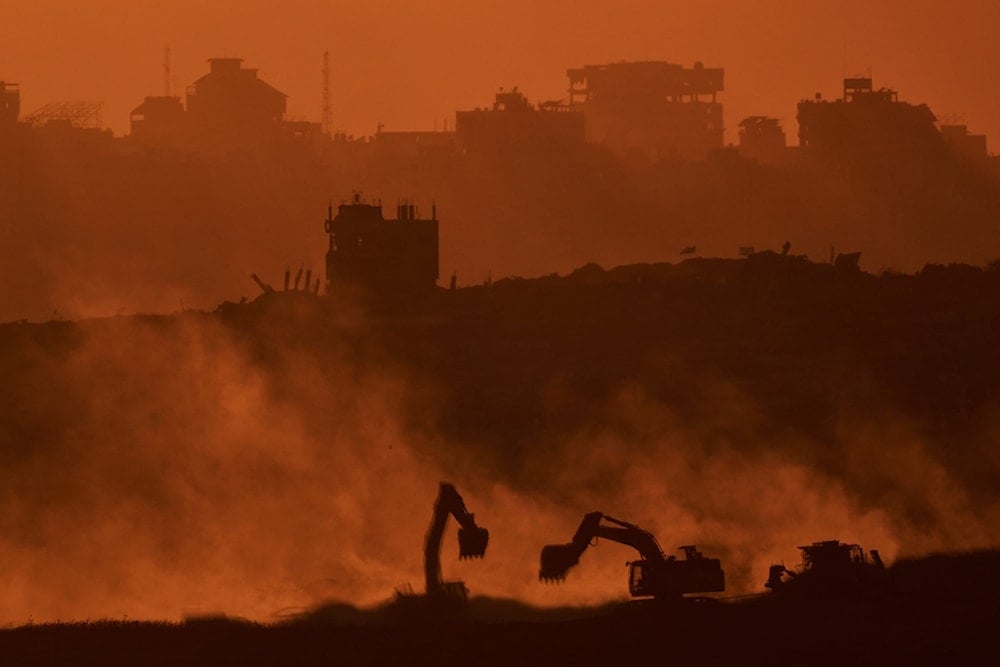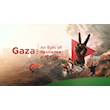Palestinian clans condemn chaos in Gaza, back security forces
Palestinian clans in Gaza denounce lawlessness by rogue groups, pledge support for security forces, and vow to withdraw protection from offenders.
-

Israeli excavators work in the Gaza Strip as the sun sets, seen from southern occupied Palestine, Tuesday, Oct. 14, 2025 (AP)
Palestinian clans and clans in the Gaza Strip issued a firm statement on Tuesday evening denouncing recent incidents of lawlessness and disorder, which they said were carried out by “rogue elements” exploiting the temporary absence of security forces amid the ongoing war.
In their statement, the tribal and clan leaders said such acts had “increased people’s suffering, compounded their hardships, and threatened their safety and livelihoods.”
They expressed full support for Gaza’s security authorities, praising their efforts to “work tirelessly day and night to restore order, deter offenders, and swiftly end the state of chaos with firmness and resolve.”
The statement also called on all Islamic and national factions to unite efforts and resources to support official plans aimed at restoring stability and ending all forms of disorder.
No protection for outlaws
The clans further declared the withdrawal of all tribal and familial protection for anyone proven to be involved in acts that “threaten social security and civil peace,” urging all families to “abide fully by this decision and immediately hand over offenders to the relevant authorities.”
On Monday, the Deterrence Force, affiliated with Gaza’s internal security, announced the continuation of its large-scale campaign across the Strip, confirming the arrest of numerous collaborators and criminal elements.
It said that “anyone proven to have collaborated with the enemy or committed crimes will be referred to judicial authorities for legal proceedings.”
The Gaza Strip has recently witnessed acts of armed disorder by groups allegedly backed by the Israeli occupation, including sabotage operations and field executions, among them the killing of journalist and activist Saleh al-Jafarawi.
Largest graveyard for journalists in modern history
Anthony Bellanger, a French-Belgian journalist, trade unionist, and historian, delivered a searing reflection in The Guardian, channeling the outrage of media workers worldwide as they watch colleagues in Gaza being killed with what he describes as Israeli impunity.
For Bellanger, history will remember the witnesses. In Gaza, that means remembering Anas al-Sharif, a young reporter killed on August 10, 2025, and the 222 other Palestinian journalists slain over the past two years, according to data from the International Federation of Journalists (IFJ). Those who sought to silence these voices, he writes, will carry condemnation forever.
For two years, Gaza has been the most dangerous place on earth to practice journalism. "Israel" has barred foreign reporters from entering, leaving Palestinian journalists, most of them members of the Palestinian Journalists’ Syndicate, affiliated with the IFJ, as the sole chroniclers of the war. They work without protection, often with their families equally exposed, and too often under direct Israeli fire.
The scale of the loss is unprecedented. Since its founding in 1926, the IFJ has not recorded such mass killings of journalists, not during World War II, nor in Vietnam, Korea, Syria, Afghanistan, or Iraq. Gaza, Bellanger argues, is now the largest graveyard for journalists in modern history.
Intentional killings
He insists these killings are not random. They represent a deliberate strategy: eliminate the witnesses, seal Gaza off from international eyes, and control the narrative. With Israeli Prime Minister Benjamin Netanyahu openly vowing to “recolonize” Gaza, information warfare is seen as inseparable from military conquest. Colonization, Bellanger writes, also means erasing the ruins, the victims, and those who dare to tell their stories.
Displacement has only deepened the crisis. Hundreds of thousands have fled southward, but the south offers no sanctuary, only overcrowding, bombardment, and entrapment between the sea and the siege. Journalists share this suffocating reality, working inside an enclave where each day of survival is more uncertain than the last.
Meanwhile, the international community’s response has been little more than symbolic. Recognition of Palestinian statehood at the UN, while historically significant, comes too late to save the living or deliver justice to the killed. The UN remains paralyzed, major powers complicit through silence and arms sales, and Palestinian reporters continue their mission alone, often to the point of death.

 4 Min Read
4 Min Read









